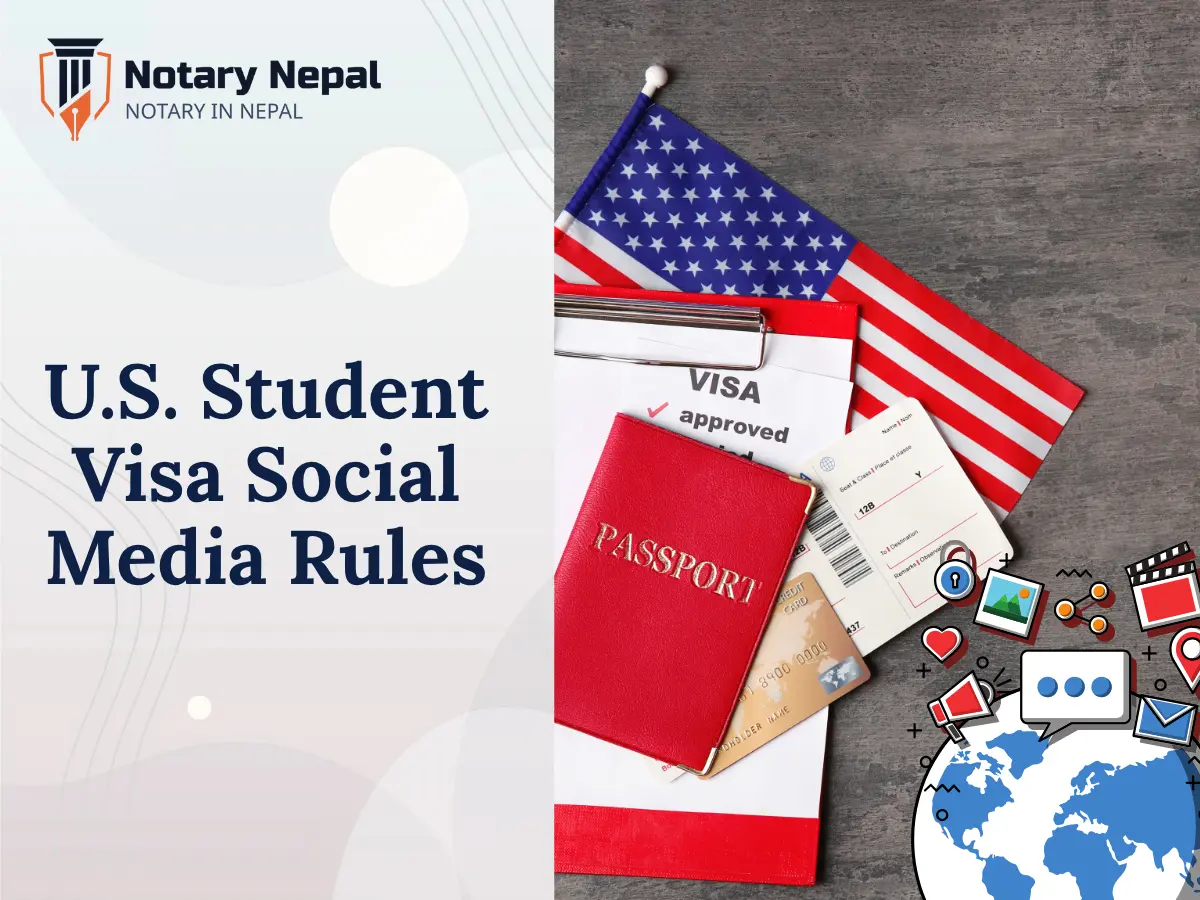

Table of Contents
In a significant update for prospective international students—including those from Nepal—seeking F‑, M‑ or J‑type U.S. visas, the U.S. State Department has rolled out a new requirement: applicants must make their social media profiles public to allow consular officers to review their “online presence.” This shift is part of broader efforts to enhance national security, but raises important concerns around privacy, academic freedom, and transparency.
What’s Changed?
1. Mandatory “Public” Social Profiles
As of June 18, 2025, all applicants for U.S. student and exchange visas must adjust their social media privacy settings to public, covering platforms like Facebook, Instagram, Twitter, LinkedIn, etc. Failure to do so may be flagged as an attempt to conceal information and could negatively impact visa adjudication.
2. Resume of Visa Interviews
Visa appointment suspensions from late May were lifted with this policy's announcement. Embassies and consulates are back to scheduling F‑, M‑, and J‑visa interviews—though with reduced volume to accommodate extra screening workload.
3. “Online Presence” Goes Beyond Social Media
Officers are directed to use search engines and online databases (like LexisNexis) to thoroughly vet an applicant's digital footprint, not just their social media activity.
4. Grounds for Concern: “Hostile Attitudes” and Security Red Flags
Visa officers are instructed to flag:
Any sign of hostility toward U.S. citizens, culture, government, or institutions.
Support for terrorism or foreign adversaries.
Promotion of antisemitic harassment or violence.
A history of political activism suggesting they might continue such activities in the U.S..
5. Documentation Requirement by Consular Officers
Officers must take detailed case notes, screenshots, and maintain thorough documentation of any concerning online activity.
Why This Matters Now
National Security Narrative
Citing threats such as terrorism, espionage, and radical activism, U.S. officials describe this as a move toward more “comprehensive and thorough vetting” of online presence to safeguard national interests.
Institutional Pressure
The policy notably prioritizes applicants to institutions with less than 15% international student ratios—part of a strategic focus on perceived lower-risk candidates.
Political Context
This rollout comes amid broader Trump-era immigration tightening, especially targeting pro-Palestinian activism on campuses. Visa revocations, particularly of Chinese nationals, have ramped up under similar policies earlier this spring.
Global Impact on U.S. Colleges
Universities reliant on international tuition income—estimated at over $40 billion per year—now face threats to both enrollment and academic reputation.
What This Means for Nepalese and International Students
Prepare Early and Proactively
Convert all social media profiles to public before starting your DS-160 and scheduling interviews.
Remove or archive any posts that might be construed as anti‑U.S., extremist, or supportive of conflicts or terrorist organizations.
Document Your Cleanup Process
Keep screenshots or change logs showing when and how you changed privacy settings—helpful if questions arise during processing.
Reflect on Online Behavior
Even older posts or affiliations can prompt scrutiny—political satire, activism, or commentary may raise red flags. Consider editing private journals, blog posts, or comments accordingly.
Know the Documentation Required
Be ready to explain flagged posts thoughtfully in interviews. Demonstrating intent to abide by visa terms is key.
Consult Experts
Utilize notarial and translation services (like Notary Nepal) to ensure credential authenticity.
Seek help from student advisors or visa consultants for guidance on managing digital footprints and legal compliance.
Checklist for Student Visa Applicants
| Task | Description |
|---|---|
| 1 | Set social profiles public on all platforms |
| 2 | Archive posts that could be misinterpreted |
| 3 | Screenshot privacy settings and dated changes |
| 4 | Prepare solutions/explanations for any flagged content |
| 5 | Obtain notarized, translated documents via providers like Notary Nepal |
Notary Nepal: Your Trusted Partner
As Nepal’s premier notarial and translation service, Notary Nepal offers:
Visa Document Notarization: certified legal authorship for affidavits, transcripts, police certificates, etc.
Certified Translation: accurate English renditions legally endorsed and consulate-ready
Online and Offline Services: serving clients across Kathmandu and beyond
Expert Guidance: dedicated support to navigate evolving embassy requirements, including privacy changes and comprehensive document vetting
Notary Nepal emerges as an essential ally for Nepalese students navigating the updated U.S. visa terrain—with the precision and credibility required for success.
Final Thoughts
The new U.S. student visa social media screening policy—now active as of June 18, 2025—marks a dramatic shift in entry requirements, emphasizing digital transparency and national security. Nepalese applicants are advised to act immediately: make profiles public, purge sensitive content, document changes, and obtain professional notarial translations. A proactive approach not only streamlines the visa process but also projects credibility, enhancing your chances of securing your academic journey in the U.S.
This article is for informational purposes only and does not constitute legal advice, advertisement, or solicitation. Notary Nepal and its team are not liable for any consequences arising from reliance on this information. For legal advice, please contact us directly.


